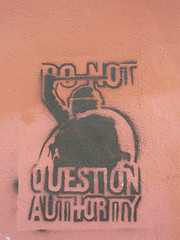Objecting to the near-limitless expansion of government authority, people of all political persuasions question, at times, the specific program or policy with which they take issue. Whether the criteria for judgment is the Constitution, statutory code, precedent, or other sources of affirmed legal authority, a comprehensive discussion regarding what government is and should be allowed to do cannot occur, however, when limited to the man-made “rule of law.”
The reason for this is simple: man-made law can be changed by man. What one day is legal can be outlawed the next; authority is created or denied by legislative, judicial, and/or fiat. Thus, the discussion of government authority, when based on these criterion alone, shifts along with changes in the code as they are made. To truly question whether the government can morally act on any given issue, a more principled and sure foundation must be established.
This foundation becomes apparent when one removes government out of the equation altogether. Instead of looking at statute or even the Constitution, contemplate a scenario in which all such legalese is completely non-existent. Consider the question of authority in a society freed from the previously existing institution of government, and returned to the individual components which themselves comprise, consent to, and empower the government just eliminated. In short, anarchy.
The Declaration of Independence states that governments are (justly) instituted to secure the rights of those creating it, “deriving their just powers from the consent of the governed.” As government is not an eternally-existing entity (though at times it may feel otherwise), the question of what authority such an organization may morally and justly possess must be addressed at this fundamental and underlying level before proceeding to erect and empower that government.
Stripped of positivist, man-made laws, this society of free and sovereign individuals would each possess their individual rights—life, liberty, and property chief among them. Any aggression would, as under any situation, be immoral and improper. Individuals would not be justified in stealing from their neighbor, coercing their neighbor into engaging in commerce with somebody they would rather not, or punishing their neighbor for consuming a plant, building a home without their permission, or failing to purchase a product.
The creation of government—an entity to defend and enforce each person’s individual and inherent rights—cannot exceed its creator in authority. This institution may only morally be empowered with authority that its various members themselves possess. In all questions of government authority, then, it is insufficient to superficially check the action against the limits of the man-made laws that govern. While this initial scrutiny is in and of itself harmless, it becomes destructive when such laws provide the government with authority for something which its members themselves would not, in the absence of that government, be able to do.
***************
Continue reading at the original source →




